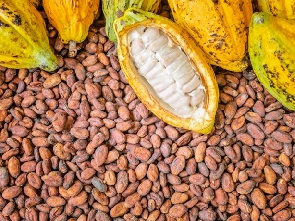Business News of Friday, 20 November 2020
Source: goldstreetbusiness.com
Ghana threatens to suspend cocoa companies’ sustainability schemes
COCOBOD is threatening to suspend the sustainability schemes used by major cocoa and chocolate companies to assure consumers that the cocoa beans they use are sustainably and ethically sourced.
In comments prepared for the latest World Cocoa Foundation conference on behalf of Ghana and its west African neighbour Ivory Coast, Joseph Aidoo, Chief Executive of Ghanaian Regulator COCOBOD said cocoa and chocolate companies in West Africa were thwarting government attempts to combat farmer poverty by trying to evade paying the Living Income Differential agreed by the two countries and global cocoa buyers.
As a result, their sustainability schemes, which allow companies such as Barry Callebaut and Nestle to charge consumers a premium for chocolate certified as sustainably sourced, could be suspended.
Ghana and Ivory Coast, which together produce two-thirds of the world’s cocoa, introduced a living income differential (LID) or premium last year of US$400 per tonne on all 2020/21 cocoa sales the proceeds of which are being used to raise the income of cocoa farmers in the form of a 28 percent increase on the amount each country’s government pays cocoa farmers per tonne of the commodity purchased at the farm gate.
“The (cocoa/chocolate) brands (have) openly announced their commitment to the LID (but) our intelligence indicates there is a ploy by some to derail (it),” Aidoo said.
“Any brand that is seen not to be serious in accepting the LID by mid-December 2020 must consider all its cocoa beans from Ghana and Cote d’Ivoire as conventional. We are prepared to name and shame these brands,” he added.
Ivory Coast and Ghana have struggled to sell forward their 2020/21 cocoa crop since introducing the LID, in large part because the coronavirus-induced recession slashed demand for non-staple foods like chocolate. However there are suspicions in Ghana that the reluctance of buyers to purchase on the forward market is a subtle attempt on the country – and Cote d’Ivoire as well – to stop insisting on adding the LID to the normal market price accepted by other, smaller cocoa exporting countries.
Ghana has traditionally sold its produce on the forward market which enables it to secure between US$1.3 billion and US$1.8 billion in short term financing from a consortium of international commercial banks. The facility – the largest annual agricultural financing facility in sub-Saharan Africa – is secured by cocoa sales proceeds from the international markets. An inability to sell on forward markets could jeopardize Ghana’s ability to raise this financing which it uses to fund its cocoa purchases from local farmers.
If Ghana goes ahead with its threat, then major chocolate makers who are the main buyers of Ghanaian cocoa would no longer be able to charge premiums on their products made from Ghanaian cocoa.













